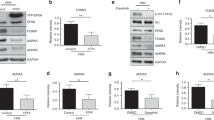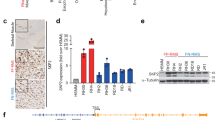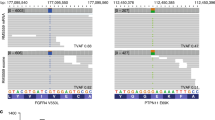Abstract
Transforming growth factor β-1 (TGF-β) acts as both a tumour suppressor and a tumour promoter in a context-dependent manner. The tumour-promoting activities of TGF-β are likely to result from a combination of Smad and non-Smad signalling pathways but remain poorly understood. Here we show that TGF-β-mediated activation of RhoA is dependent on the kinase activity of ALK5 and that continuous ALK5 activity maintains basal RhoA–ROCK signalling, cell morphology and actin dynamics in serum-starved rodent fibroblasts independently of Smad2, Smad3 and Smad4. In immortalized human diploid fibroblasts, we show that oncogenic rewiring by transduction of V12HaRas instigates regulation of RhoA–ROCK signalling through an autocrine TGF-β1–ALK5 pathway. Furthermore, we show that ALK5-mediated activation of RhoA is required for efficient V12HaRas, V-Raf and V600EBRAF transformation and V12HaRas-mediated anchorage-independent growth. These findings identify a new pro-oncogenic activity of TGF-β and indicate that tumours harbouring V12HaRas and V600EBRAF mutations may be susceptible to TGF-β signalling inhibitors.
This is a preview of subscription content, access via your institution
Access options
Subscribe to this journal
Receive 50 print issues and online access
$259.00 per year
only $5.18 per issue
Buy this article
- Purchase on Springer Link
- Instant access to full article PDF
Prices may be subject to local taxes which are calculated during checkout






Similar content being viewed by others
References
Bhowmick NA, Ghiassi M, Aakre M, Brown K, Singh V, Moses HL . (2003). TGF-beta-induced RhoA and p160ROCK activation is involved in the inhibition of Cdc25A with resultant cell-cycle arrest. Proc Natl Acad Sci USA 100: 15548–15553.
Bhowmick NA, Ghiassi M, Bakin A, Aakre M, Lundquist CA, Engel ME et al. (2001). Transforming growth factor-beta1 mediates epithelial to mesenchymal transdifferentiation through a RhoA-dependent mechanism. Mol Biol Cell 12: 27–36.
Bruna A, Darken RS, Rojo F, Ocana A, Penuelas S, Arias A et al. (2007). High TGFbeta-Smad activity confers poor prognosis in glioma patients and promotes cell proliferation depending on the methylation of the PDGF-B gene. Cancer Cell 11: 147–160.
Chen D, Zhao M, Mundy GR . (2004). Bone morphogenetic proteins. Growth Factors 22: 233–241.
Chen S, Crawford M, Day RM, Briones VR, Leader JE, Jose PA et al. (2006). RhoA modulates Smad signaling during transforming growth factor-beta-induced smooth muscle differentiation. J Biol Chem 281: 1765–1770.
Crook T, Marston NJ, Sara EA, Vousden KH . (1994). Transcriptional activation by p53 correlates with suppression of growth but not transformation. Cell 79: 817–827.
Derynck R, Zhang YE . (2003). Smad-dependent and Smad-independent pathways in TGF-beta family signalling. Nature 425: 577–584.
Edlund S, Landstrom M, Heldin CH, Aspenstrom P . (2002). Transforming growth factor-beta-induced mobilization of actin cytoskeleton requires signaling by small GTPases Cdc42 and RhoA. Mol Biol Cell 13: 902–914.
Goulimari P, Kitzing TM, Knieling H, Brandt DT, Offermanns S, Grosse R . (2005). Galpha12/13 is essential for directed cell migration and localized Rho-Dia1 function. J Biol Chem 280: 42242–42251.
Inman GJ, Nicolas FJ, Callahan JF, Harling JD, Gaster LM, Reith AD et al. (2002). SB-431542 is a potent and specific inhibitor of transforming growth factor-beta superfamily type I activin receptor-like kinase (ALK) receptors ALK4, ALK5, and ALK7. Mol Pharmacol 62: 65–74.
Jaffe AB, Hall A . (2005). Rho GTPases: biochemistry and biology. Annu Rev Cell Dev Biol 21: 247–269.
Kang Y, He W, Tulley S, Gupta GP, Serganova I, Chen CR et al. (2005). Breast cancer bone metastasis mediated by the Smad tumor suppressor pathway. Proc Natl Acad Sci USA 102: 13909–13914.
Larsson J, Goumans MJ, Sjostrand LJ, van Rooijen MA, Ward D, Leveen P et al. (2001). Abnormal angiogenesis but intact hematopoietic potential in TGF-beta type I receptor-deficient mice. EMBO J 20: 1663–1673.
Massague J, Seoane J, Wotton D . (2005). Smad transcription factors. Genes Dev 19: 2783–2810.
Moustakas A, Heldin CH . (2005). Non-Smad TGF-beta signals. J Cell Sci 118: 3573–3584.
Olson MF, Paterson HF, Marshall CJ . (1998). Signals from Ras and Rho GTPases interact to regulate expression of p21Waf1/Cip1. Nature 394: 295–299.
Ozanne BW, Spence HJ, McGarry LC, Hennigan RF . (2006). Invasion is a genetic program regulated by transcription factors. Curr Opin Genet Dev 16: 65–70.
Pardali K, Moustakas A . (2007). Actions of TGF-beta as tumor suppressor and pro-metastatic factor in human cancer. Biochim Biophys Acta 1775: 21–62.
Qiu RG, Chen J, McCormick F, Symons M . (1995). A role for Rho in Ras transformation. Proc Natl Acad Sci USA 92: 11781–11785.
Roberts AB, Wakefield LM . (2003). The two faces of transforming growth factor beta in carcinogenesis. Proc Natl Acad Sci USA 100: 8621–8623.
Sahai E, Alberts AS, Treisman R . (1998). RhoA effector mutants reveal distinct effector pathways for cytoskeletal reorganization, SRF activation and transformation. EMBO J 17: 1350–1361.
Sahai E, Ishizaki T, Narumiya S, Treisman R . (1999). Transformation mediated by RhoA requires activity of ROCK kinases. Curr Biol 9: 136–145.
Sahai E, Marshall CJ . (2002). RHO-GTPases and cancer. Nat Rev Cancer 2: 133–142.
Sahai E, Olson MF, Marshall CJ . (2001). Cross-talk between Ras and Rho signalling pathways in transformation favours proliferation and increased motility. Embo J 20: 755–766.
Shen X, Li J, Hu PP, Waddell D, Zhang J, Wang XF . (2001). The activity of guanine exchange factor NET1 is essential for transforming growth factor-beta-mediated stress fiber formation. J Biol Chem 276: 15362–15368.
Shi Y, Massague J . (2003). Mechanisms of TGF-beta signaling from cell membrane to the nucleus. Cell 113: 685–700.
Uehata M, Ishizaki T, Satoh H, Ono T, Kawahara T, Morishita T et al. (1997). Calcium sensitization of smooth muscle mediated by a Rho-associated protein kinase in hypertension. Nature 389: 990–994.
Vardouli L, Moustakas A, Stournaras C . (2005). LIM-kinase 2 and cofilin phosphorylation mediate actin cytoskeleton reorganization induced by transforming growth factor-beta. J Biol Chem 280: 11448–11457.
Wakefield LM, Roberts AB . (2002). TGF-beta signaling: positive and negative effects on tumorigenesis. Curr Opin Genet Dev 12: 22–29.
Zheng Y, Olson MF, Hall A, Cerione RA, Toksoz D . (1995). Direct involvement of the small GTP-binding protein Rho in lbc oncogene function. J Biol Chem 270: 9031–9034.
Acknowledgements
We thank P ten-Dijke, R Treisman, C Hill, T Crook, X-F Wang, R Derynck, A Hall and M Olson for valuable reagents. We thank J Wyke and M Olson for critically reading the paper and for discussions during the course of this work. This work was supported by an Association for International Cancer Research fellowship to GJI (GJI, YMF, GJF and LCS) and Cancer Research UK (YMF, GJI, GJF, LCS, and BWO).
Author information
Authors and Affiliations
Corresponding author
Additional information
Supplementary Information accompanies the paper on the Oncogene website (http://www.nature.com/onc)
Supplementary information
Rights and permissions
About this article
Cite this article
Fleming, Y., Ferguson, G., Spender, L. et al. TGF-β-mediated activation of RhoA signalling is required for efficient V12HaRas and V600EBRAF transformation. Oncogene 28, 983–993 (2009). https://doi.org/10.1038/onc.2008.449
Received:
Revised:
Accepted:
Published:
Issue Date:
DOI: https://doi.org/10.1038/onc.2008.449
Keywords
This article is cited by
-
Pharmacoproteomic analysis reveals that metapristone (RU486 metabolite) intervenes E-cadherin and vimentin to realize cancer metastasis chemoprevention
Scientific Reports (2016)
-
TGFβ-mediated suppression of CD248 in non-cancer cells via canonical Smad-dependent signaling pathways is uncoupled in cancer cells
BMC Cancer (2014)
-
Crosstalk of Ras and Rho: activation of RhoA abates Kras-induced liver tumorigenesis in transgenic zebrafish models
Oncogene (2014)
-
A human monoclonal antibody 264RAD targeting αvβ6 integrin reduces tumour growth and metastasis, and modulates key biomarkers in vivo
Oncogene (2013)
-
Efficient TGF-β/SMAD signaling in human melanoma cells associated with high c-SKI/SnoN expression
Molecular Cancer (2011)



